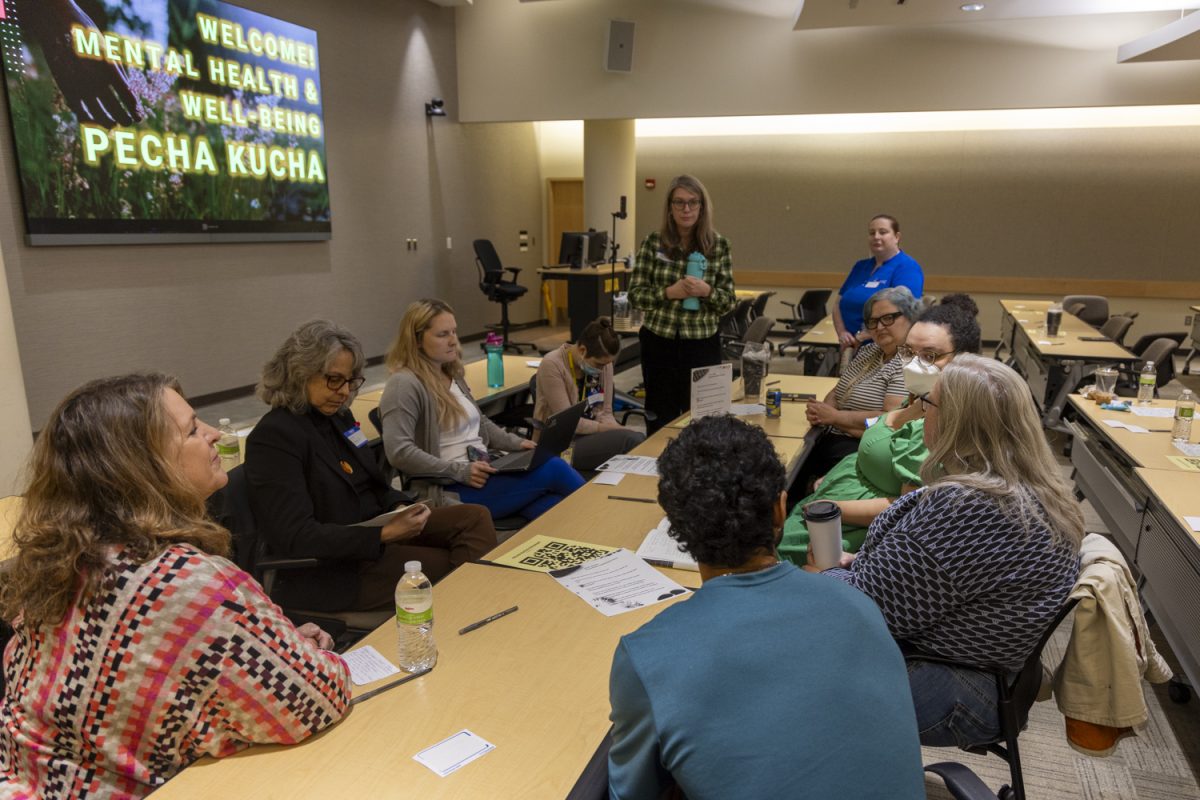Over the past few years, mental health in schools and the workplace has been a large topic of discussion. Thursday, the University of Iowa Oberman Center and Scanlan Center for School Mental Health took a new approach to mental health discussions and education.
The event called a pecha kucha, which is Japanese for chit-chat, was divided into three sessions, each with three presenters. Each speaker presented 20 slides and was given 20 seconds to speak per slide.
Each session had a specific focus: self, others, and community.
This fast-paced presentation style allows the audience to be more engaged with the speaker and learn more in a short time, counseling psychologist and Scanlan Director of Higher Education Programming Barry Schreier said.
Schreier said the goal of the pecha kucha was to expose anyone on campus to all the different mental health efforts being made in different departments and colleges across campus.
“We found out that people were doing really cool, smart, creative things on this campus that only the little corner of the campus where they work knows about it, and there’s just not a way for them to sort of communicate the creative, interesting, innovative things they’ve been doing,” he said. “So, we created this platform, and what we wanted to do is give people a platform to have a larger audience to share what they were doing.”
Schreier also said the pecha kucha format allows for more digestible conversations about mental health.
“We thought it would be better if people could be able to engage in storytelling and tell a story, rather than like, ‘According to research or blah blah,’” he said. “But to sort of just get up and say, ‘Here’s who I am, here’s my history, here’s the thing I identified as a need. Here’s kind of the innovative thing we did, and here’s the impact we’ve discovered, and here’s how you can take what we’re doing and do that in your part of the campus as well.’”
Associate Director of Student Experience in the Tippie College of Business Dusty Persinger is also a member of the working group and shared her excitement about sharing mental health resources and strategies with the whole campus.
“I want there to be components of reflection, and also, concrete steps that are feasible for them to implement,” she said.
The topics discussed during the community session were mental health policies for students, the mental health of international students, and the benefits of nature on mental health.
Counseling psychology doctoral student in the College of Education Iris Peimann spoke about leave of absence policies and how they decrease the likelihood that students will drop out of school due to mental health issues.
Indiana University and the University of Michigan allow students to take a leave of absence from school that guarantees them enrollment when they feel they are ready to return. Peimann said students are less likely to drop out when provided this policy because it takes the stress of finishing their degree away when they are struggling to stay healthy.
“This is actually a policy that’s pretty well supported in the literature that we do not have on campus here,” she said. “If you’re an advocate for policy, this can be something that you work towards.”
International Education Program & Student Affairs Advisor Shuhui Lin discussed how her program is reaching out to students from other countries and helping them through the transition.
“Moving to a different country is not easy,” Lin said. “How do our international community care for themselves and one another, and what are some of the unique strengths that our international community brings to kind of mental well-being and support each other.”
The final speaker of the sessions Ellen Carman is a program coordinator in the College of Engineering and a former camp counselor at the Macbride Nature Recreation Area. She shared stories about experiences with nature and how connecting with the natural world can be grounding in times of stress or anxiety.
“We can allow these outdoor places to be a place where we practice caring for ourselves,” she said. “Let’s go outside, take a break and let the natural world remind us we are works in progress, and we are exactly where we need to be today.”
Session attendee Amanda Kane said she’s excited to apply the takeaways from the presentation to her work.
“I thought that was very exciting thinking about programs that we can actually, like hands on train people in to work towards that culture of wellness,” she said.



